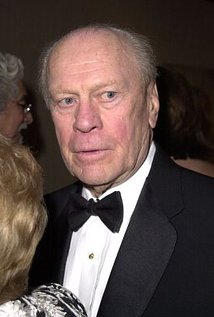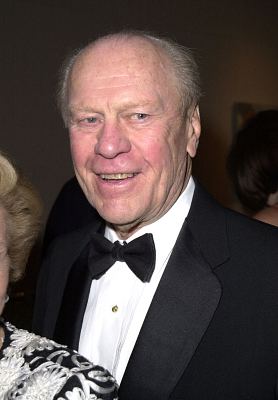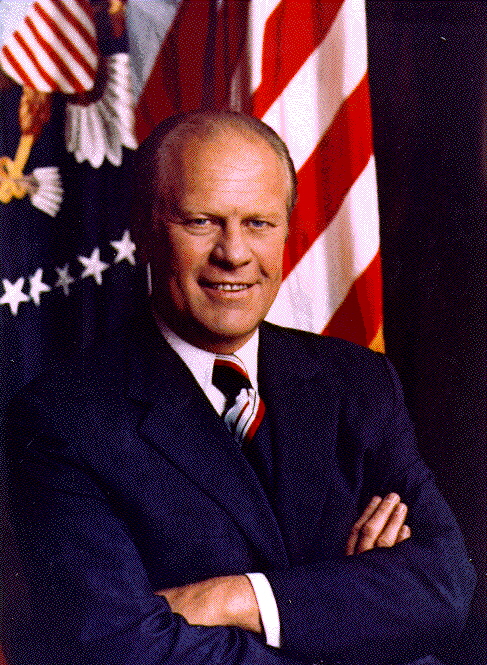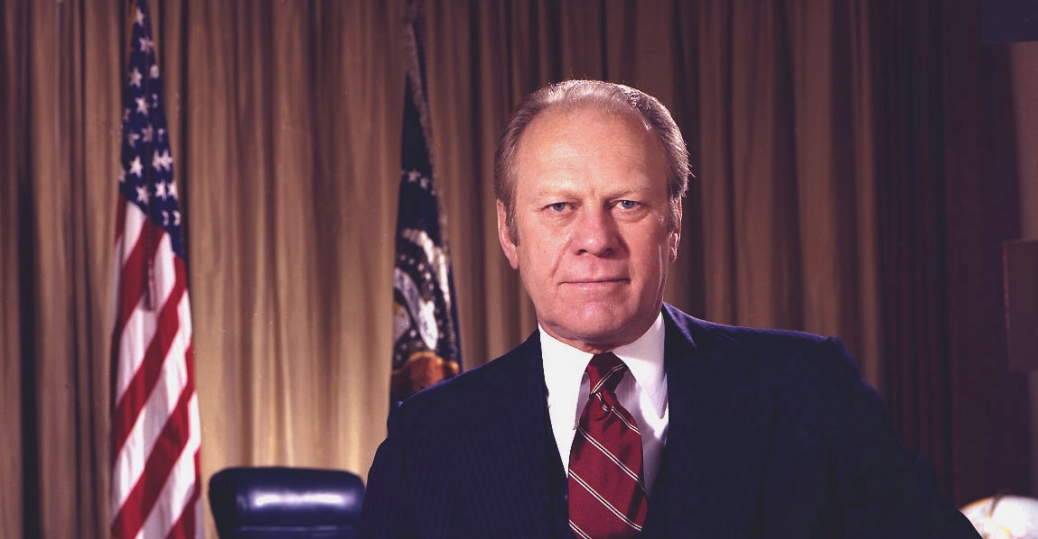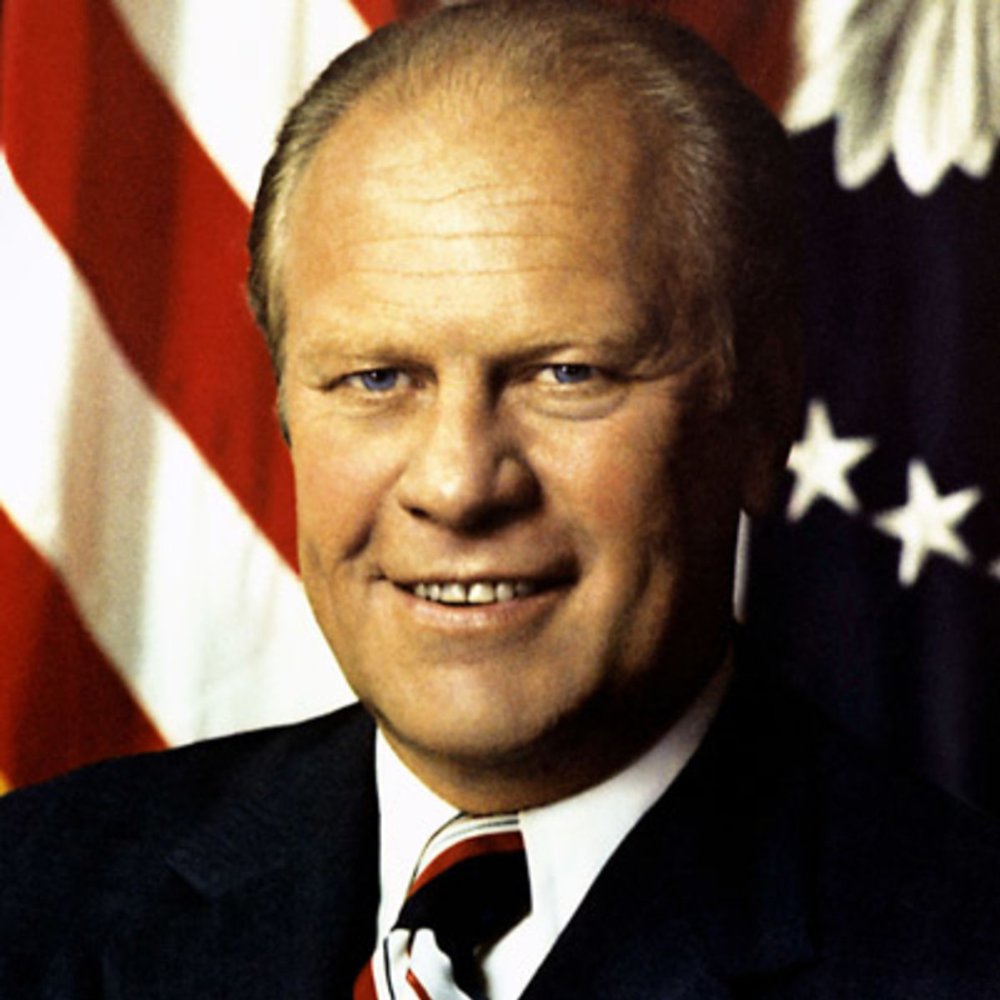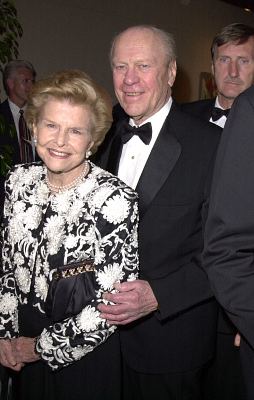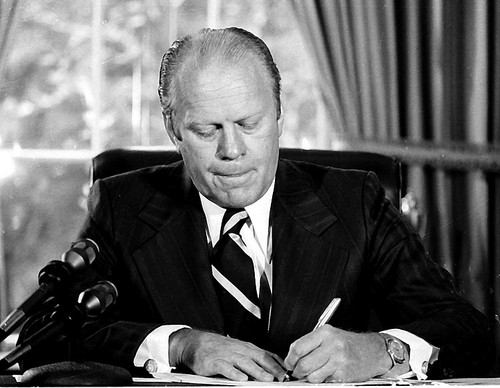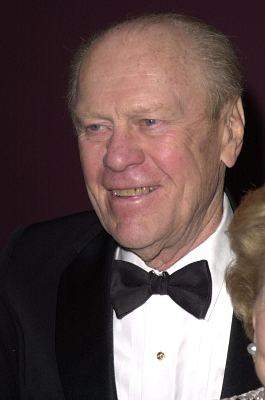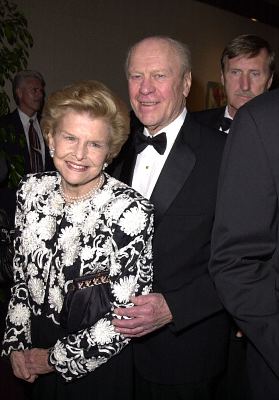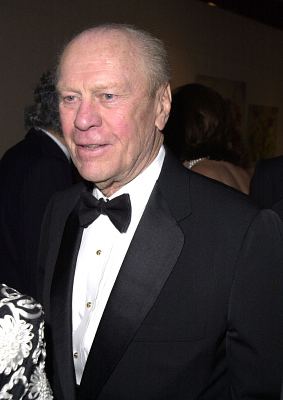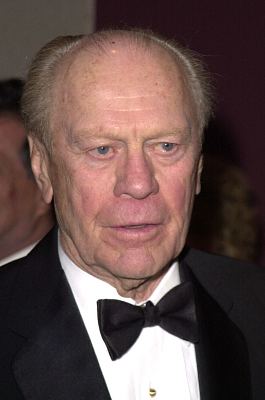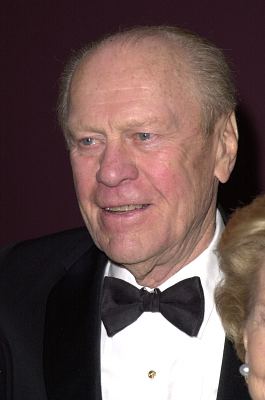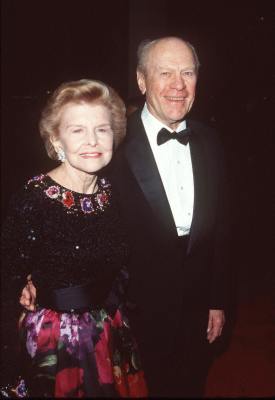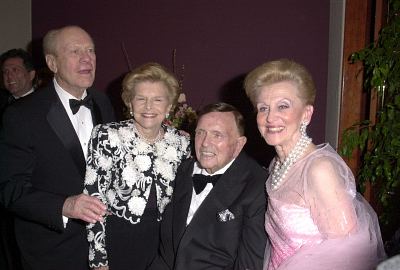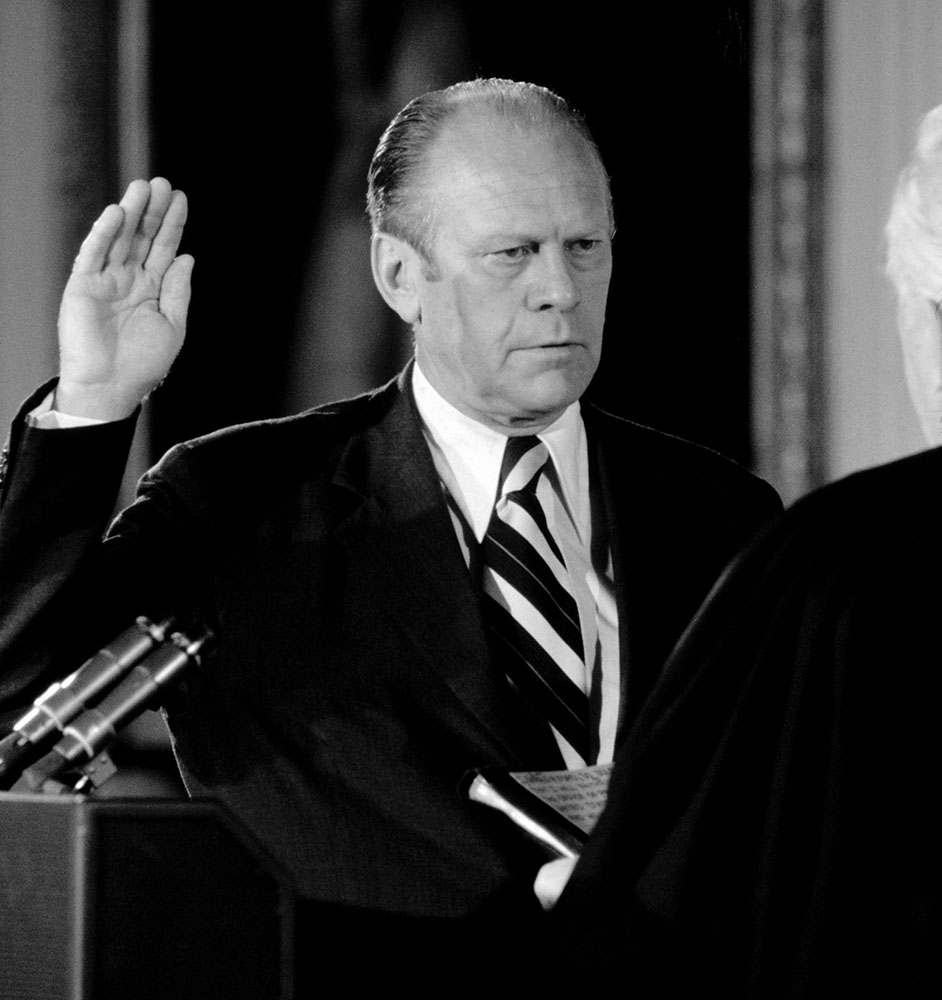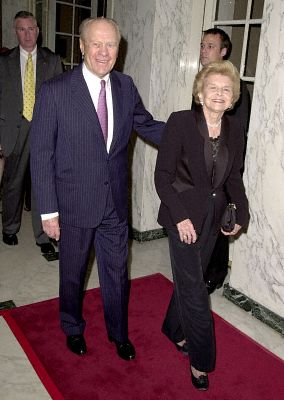Gerald Rudolph Ford was the 38th President of the United States from August 1974 until January 1977.Ford was born on July 14, 1913, in Omaha, Nebraska as Leslie Lynch King, Jr., being the son of Leslie Lynch King and Dorothy Ayer Gardner King. His parents separated two weeks after his birth and his mother took him to Grand Rapids, Michigan to live with her parents. On February 1, 1916, his mother Dorothy King married Gerald R. Ford, a paint salesman. The Fords began calling their son Gerald R. Ford, Jr. but this name became legal only on December 3, 1935. Aged 13, Ford knows that Gerald Ford Sr., was not his biological father, but it lasted until 1930 he met his biological father Leslie King, who made an unexpected stop in Grand Rapids.Ford grew up in a family with three younger half-brothers (Thomas, Richard, and James). He attended South High School in Grand Rapids, where he already showed is athletics skills, being named to the honor society and the "All-City" and "All-State" football teams. As a scout he was ranked Eagle Scout in November 1927. He earned money by working in the family paint business and at a local restaurant.Ford attended The University of Michigan at Ann Arbor from 1931 to 1935. He majored in economics and political science and graduated with a B.A. degree in June 1935. He played on the University's national championship football teams in 1932 and 1933 and was voted MVP of Wolverine in 1934. He also played in All-Star and benefit football games. He denied offers from two professional football teams, (Detroit Lions and Green Bay Packers), but chose to become boxing coach and assistant varsity football coach at Yale hoping to attend law school there. Ford earned his law degree in 1941.After returning to Michigan and passing his bar exam, Ford set up a law partnership in Grand Rapids with Philip Buchen, a University of Michigan fraternity brother (who later served on Ford's White House staff as Counsel to the President).In April 1942 Ford joined the U.S. Naval Reserve and became a physical fitness instructor at a flight school in Chapel Hill, North Carolina. In the spring of 1943 he began service in the light aircraft carrier USS Monterey. Ford spent the remainder of the war ashore and was discharged as a lieutenant commander in February 1946. He returned to Grand Rapids to become a partner in the locally prestigious law firm of Butterfield, Keeney, and Amberg.His first political experience was in the summer of 1940 when he was working in the presidential campaign of Wendell Willkie. Six years later he decided to challenge Bartel Jonkman for the Republican nomination for the U.S. House of Representatives in the 1948 election. Ford won the nomination and after that was elected to Congress on November 2, 1948, receiving 61% of the vote.On October 15 1948, the height of the campaign, Ford married Elizabeth ('Betty') Anne Bloomer Warren, a department store fashion consultant. Betty was born on April 8, 1918 in Chicago, Illinois, but grew up in Grand Rapids. They subsequently had four children: Michael Gerald (March 14, 1950), John Gardner (March 16, 1952), Steven Meigs (May 19, 1956) and Susan Elizabeth (July 6, 1957).Ford served in the House of Representatives from January 3, 1949 to December 6, 1973. He was re-elected twelve times, winning each time with more than 60% of the vote. As his ambition was to become Speaker of the House already in the early 1950s, he denied offers to run for both the Senate and the Michigan governorship in these years. In 1961 he became chairman of the House Republican Conference. In 1963 President Johnson appointed Ford to the Warren Commission to investigate the assassination of President John F. Kennedy. He was the last living member of the Warren Commission.In 1965 Ford was chosen as the House minority leader, a post he held until 1973. As minority leader Ford made more than 200 speeches a year all across the country, which made him nationally known. He was not only a close friend of Richard Nixon for many years, but also a loyal supporter in both the 1968 and 1972 presidential elections. As in 1960, Ford was again considered as a vice presidential candidate in 1968. Because the Republicans did not attain a majority in the House, Ford was unable to reach his ultimate political goal, Speaker of the House. Instead, he became president of the Senate.Late in 1973 Spiro Agnew pleaded no contest to a charge of income tax evasion and resigned as Vice President. President Nixon was empowered by the 25th Amendment to appoint a new vice president and chose Ford. He was sworn in on December 6, 1973.On August 9, 1974, Nixon became the first president in U.S. history to resign from the office under the threat of impeachment in the Watergate scandal. The same day Gerald R. Ford took the oath of office as 38th President of the United States on August 9, 1974. Also in August 1974, Ford nominated Nelson Rockefeller for vice president, which nomination was confirmed by Congress on December 19, 1974.One month after taking office President Ford faced one of the toughest decisions in his career. He decided to grant Nixon a full, free and absolute pardon for all offences against the United States which he has committed or may have committed or taken part in. The public opinion was mostly negative about the pardon and there was even suspicion Ford and Nixon had made a deal to grant a pardon if Nixon would resign. Although this happened on September 8, 1974, it might have cost the re-election of Ford two years later.On November 24, 1974, in the conference hall of the Okeansky Sanitarium, Vladivostok, USSR, President Ford and Soviet General Secretary Leonid Brezhnev signed the SALT-treaty, following talks on the limitation of strategic offensive armsIn March 1975, during the final days of the Vietnam War, Ford ordered the airlift of about 237,000 Vietnamese refugees to the United States. Two months later, on May 14, 1975, Ford ordered U.S. forces to retake the S.S. Mayaguez after its seizure by Cambodia, an action Ford characterized as an "act of piracy." The operation saved the ship's 39-member crew, but sadly 41 Americans were killed and 50 more wounded during the preparation and execution of the rescue.President Ford was twice the target of assassination attempts. Both took place in on two separate trips to California in September 1975 and both were 'performed' by women. On September 5, 1975 he survived an assassination attempt in Sacramento, California, by Lynette "Squeaky" Fromme, a member of a cult once led by convicted mass murderer Charles Manson. On September 22, 1975, in San Francisco, California, Sara Jane Moore fired a shot at the president, but a bystander diverted the shot.Despite his former athletics skills, Gerald Ford tumbled several times during his presidency. No cause was ever communicated.At the Republican National Convention in August 1976, Ford fought off a serious challenge from Californian Governor Ronald Reagan to be nominated as his party's presidential candidate. He chose Senator Robert Dole of Kansas as his running mate.Although he succeeded in closing in on Democrat Jimmy Carter's large lead in the polls, President Ford finally lost one of the closest elections in history in November 1976.After leaving office, Gerald and Betty Ford returned to private life and moved to California where they built a new house in Rancho Mirage, which became his last residence.President Ford continued to actively participate in the political process and to speak out on important political issues. He lectured at hundreds of colleges and universities.In 1981, the Gerald R. Ford Library in Ann Arbor, Michigan, and the Gerald R. Ford Museum in Grand Rapids, Michigan, were dedicated.President Ford was the recipient of numerous awards and honors by many civic organizations, like the recipient of many honorary Doctor of Law degrees from various public and private colleges and universities.In August 1999, President Bill Clinton presented Ford with the nation's highest civilian award, the Medal of Freedom. Two months later, in October 1999, Senate and House leaders presented Ford and his wife, Betty, with the Congressional Gold Medal. Together with former President Carter, he served as honorary Co-Chair of the National Commission on Federal Election Reform in 2001. In May 2001 he was presented with the Profiles in Courage award for his controversial decision to pardon former President Nixon.In August 2000 Ford suffered a mild stroke while attending the Republican National Convention in Philadelphia, Pennsylvania. On May 16, 2003 following fluctuations in blood pressure and hot weather, Ford suffered dizzy spells on the golf course and taken to hospital. He was released the next day.Although President Ford cut back on his travel and public appearances in recent years, he attended funeral services for President Ronald Reagan at Washington's National Cathedral, sitting with former Presidents Clinton, Bush and Carter, and their wives in June 2004.In August 2006, he was discharged from the Mayo Clinic in Rochester, Minnesota, after doctors tried to reduce or eliminate blockages in his coronary arteries. They also implanted a pacemaker to improve his heart performance. In the fall of 2006 Ford spent several days at Eisenhower Medical Center in Rancho Mirage for medical tests. He was released on October 16.On November 12, 2006, Ford officially became the longest-lived president, surpassing Ronald Reagan. Ford would extend the record by 45 days.On December 26, 2006 at 6:45 p.m., President Ford died in his house in Rancho Mirage, California. He was aged 93 years and 165 days old, making him the longest-lived United States President. No cause of death was communicated. A state funeral and memorial services were held at the National Cathedral in Washington, D.C. on January 2, 2007. President Ford was buried at his presidential museum in Grand Rapids, Michigan.President Gerald Ford is survived by his wife Betty, after more than 58 years of marriage, and by their four children, seven grandchildren and four great-grandchildren. He is also survived by his brother, Richard, of Grand Rapids, Michigan.
Show less «

